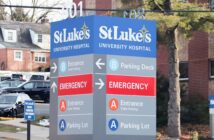Lehigh University has started its fall semester with some students opting to live on or near campus. With this in mind, The Brown and White spoke with Kristen Wenrich, health director for the City of Bethlehem, to find out how Bethlehem has been doing since the pandemic began, whether Lehigh students have affected her work in the local community and her thoughts about what the upcoming months may look like.
Q: How has Bethlehem been doing in terms of COVID-19?
Kristen Wenrich: We’ve had programs that are dedicated to dealing with these types of situations, should they occur, and we had a lot of planning and collaboration in the community. We had outbreak response plans that had already been developed, and we had those relationships with already existing agencies, so I feel like in Bethlehem and in the Lehigh Valley in general that we responded as best we can under the circumstances. Although we have plans and have drilled for outbreak-type scenarios, I don’t think anybody could have ever predicted such a long-lasting scenario, and at this point we’re not quite sure when it’s going to end.
Early on, as with most communities, we did see a surge. We were focused on looking at certain populations in the city that were most impacted. We do have a data dashboard on the City of Bethlehem’s website … it provides information as far as the number of cases, the number of deaths, hospitalization data, as well as demographic data. That was something we instituted early on so we could conduct our surveillance activities and monitor if there were certain pockets looking at age groups, looking at neighborhoods, looking at race and ethnicity data, looking at all that information to see how we could best target those groups that were experiencing high rates of coronavirus.
Within, I’d say, the last month, month and a half, our cases have decreased. We were averaging about one or two cases a day. About the last week, I’d say we’ve started to see a slight uptick, which was something we had prepared for because of Labor Day. We anticipated that we would see a potential increase in the number of cases.
Q: Over the summer, there was news that the city was receiving a large number of complaints about businesses and residents not following CDC guidelines. Are you still dealing with these complaints today?
KW: We are still responding to complaints, so if we get complaints we will go out and will do an inspection, but we’re also doing proactive visits. So, businesses we’re visiting, they might not have had a complaint lodged against them, but we want to make sure because guidance is always changing, and there’s a lot of confusion. Restaurant capacity just increased once again, so we want to make sure that the businesses are using us as a resource to provide the latest information. A lot of them have questions and have been pretty receptive to our visits, but we still are getting the occasional complaint — certainly not as much as it had been early on — but we’ll get complaints that customers aren’t masking or there’s not social distancing, and we’ll go out, as I said, and investigate.
Q: Has the return of Lehigh students affected your work?
KW: We worked with both Moravian and Lehigh and, to some extent, Northampton Community College because they have a small satellite campus in Bethlehem and, additionally, the Bethlehem school district. Working with them really just on their reopening plans was where most of our time has been spent. Lehigh in particular, now that this semester has started and you have the students back on campus, I think we’ve had about seven cases total. So, it really hasn’t been a huge surge in work on our end. More of our effort was spent prior to the students arriving. We were assisting with the reopening plans, sports guidance and the contact tracing piece because we are working very closely with Lehigh if there is a positive (case). They are assisting with the contact tracing to notify other people who are in close contact and ensuring that they’re quarantined. But we haven’t seen a huge surge and the amount of cases just because Lehigh is back.
**Editor’s note: There are currently 15 cases at Lehigh as of 9/29, according to Lehigh’s dashboard.
Q: What are the main issues the Health Bureau will be focusing on in the upcoming months?
KW: Right now, we’re gearing up for our mass flu vaccine clinics. So that’s something that we want to make sure (we address) because there is a concern that if you have the flu circulating at the same time as coronavirus, there are concerns about complications due to that. So, we’re focusing on that as well as gearing up for planning for the COVID vaccine. You probably have heard such varying timelines as far as when the vaccine will become available. It seems like every day they have a new timeline depending on who’s giving the speech about it.
From what we’re understanding from the Department of Health, there could be some vaccine that’s available this year. But, if there is a vaccine that becomes available, it’s really going to target a population … but we don’t foresee any mass vaccination clinics happening until 2021. We’re preparing for both of those events. We are also preparing for additional contact tracers, bringing additional contact tracers onboard and training them. So, in the event that we have a surge in cases, we have enough staff to be able to handle the contact tracing requirements.
Q: Is there information or tips that you would like more Lehigh students to know about the pandemic in these upcoming months?
KW: I think the one thing to stress — which we’re stressing universally and in the community — is the masking and the social distancing. Obviously, there’s concern with college students, they want to congregate, and they want to hang out with their friends. Although you know the younger population might not see as many of the complications as somebody who’s older or has chronic conditions, you could be a carrier and you could end up getting somebody really sick. So just heeding to advice that’s already out there, minimizing the congregating and just using the general precautions that have been widely publicized … and the flu vaccine. I think urging everybody to get the flu vaccine, we’re not quite sure if the flu vaccine will be able to be given with the COVID vaccine, so we’re really pushing that early on in the fall to make sure that everyone is vaccinated.
Q: Is there anything else that you would like to share about your experience with work during the pandemic?
KW: It definitely has been a unique experience. Like I said, we’ve had public health emergency preparedness — really since 9/11 — and we’ve done tabletop and drills. We’ve done drills with Lehigh University in the past, but I think people thought it would be — if there would ever be some kind of outbreak or pandemic situation — short lived. Starting this in March and still dealing with this, some days I say it’s like Groundhog Day because it’s really every day dealing with coronavirus. And it’s been difficult as the director of a health department because I have a lot of other things that I need to focus on that have been paused really since March.
We just launched a new strategic plan, we did a community health needs assessment last fall and we have a community health improvement plan that outlines some of the priorities that we want to work on. All of those things have been shelved, and we’re trying to get back to normal operations, or as normal as we can, so that’s been a little bit difficult. And just trying to change some of our programming to virtual programming. As you know a lot of organizations are in this same boat, but we do a lot of group level interventions and classes and educational sessions and we’ve had to change the formatting. So that’s been a little bit challenging, but we’re working through everything as best as we can.






Comment policy
Comments posted to The Brown and White website are reviewed by a moderator before being approved. Incendiary speech or harassing language, including comments targeted at individuals, may be deemed unacceptable and not published. Spam and other soliciting will also be declined.
The Brown and White also reserves the right to not publish entirely anonymous comments.